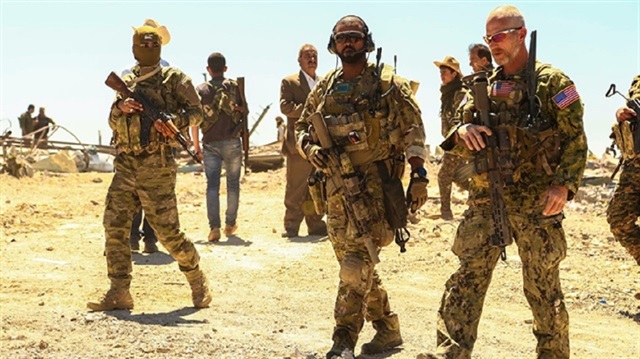
The U.S. has set up 13 military bases in Syria, which host up to 7,000 American soldiers who provide support to all types of terror organizations
Despite proclaiming Daesh’s defeat, the U.S. has continued to provide weapons and logistical support to Kurdistan Workers’ Party (PKK) terrorists and establish military bases in PKK-occupied areas, which runs against the efforts of Turkey, Russia and Iran to protect the territorial integrity of Syria.
The U.S. has set up 13 military bases in Syria, which host up to 7,000 American soldiers who provide support to all types of terror organizations.

After setting up the Hasakah-Rmeilan Military Base in Syria, the Pentagon later established bases in Ayn al-Arab, Tal Abyad, Sulok, Karakozak, Sad Tishrin, Manbij, Rassoulein and Tabqa.
The Pentagon also turned the Lafarge Cement Factory into a military base as it attempts to camouflage its facilities.
U.S. bases in Syria vary in terms of the soldiers, arms, munitions and armored vehicles allocated to each facility, as some bases host 25 to 35 soldiers, while others that are located closer to city centers are manned by 400 to 700 soldiers.
Between 2015 and 2017, PKK terrorists have regularly held conferences in U.S.-established bases in Syria, one of which was attended by terrorist Murat Karayılan.
PKK terrorists also regularly gather at U.S. bases in Rmeilan, Manbij and Sad Tishrin.
Armed U.S. agents have overseen missions in the regions of Jarabulus-Zor-Maghar-Manbij in order to protect PKK/PYD terrorists against the alliance of the Turkish Armed Forces (TAF) and Free Syrian Army (FSA), as the U.S. regularly shares the TAF’s every move with PKK terrorists.

By turning into a hotbed for dozens of thousands of terrorists, northern Syria is similar to 1980’s Lebanon’s Bekaa Valley, where numerous terror camps were established through the active backing of Western countries. Many terrorists linked to radical foreign organizations are operating in the area.
The 5,000-terrorist-strong “International Battalion” is operating in PKK-occupied regions where it provides training to foreign terrorists.
As is the case with Daesh terrorists who were rescued by the U.S. from Raqqa, terrorists in northern Syria are being armed to attack Turkey and contribute to instability in the region, which is the biggest threat facing the peace process in Syria.

After having been arrested in Aydın pending investigation into PKK/PYD ties, former British soldier Joseph Andrew Robinson was freed on probation.
According to Robinson’s statement, he traveled to Syria to work as a “medic” alongside the PKK/PYD in Syria’s Ayn al-Arab, claiming he did not partake in combat.
He stated that before traveling to Syria, he was not aware that the PKK/PYD was a terrorist organization and that he made the decision to leave the PYD/YPG terror group by crossing to Iraq upon learning it was linked to the PKK.
After being released on probation, Joseph faces up to 10 years in prison on charges of “joining an armed terror organization.”





